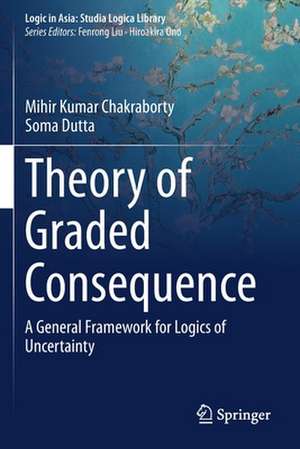Theory of Graded Consequence: A General Framework for Logics of Uncertainty: Logic in Asia: Studia Logica Library
Autor Mihir Kumar Chakraborty, Soma Duttaen Limba Engleză Paperback – 14 aug 2020
| Toate formatele și edițiile | Preț | Express |
|---|---|---|
| Paperback (1) | 373.92 lei 6-8 săpt. | |
| Springer Nature Singapore – 14 aug 2020 | 373.92 lei 6-8 săpt. | |
| Hardback (1) | 376.53 lei 38-44 zile | |
| Springer Nature Singapore – aug 2019 | 376.53 lei 38-44 zile |
Preț: 373.92 lei
Nou
Puncte Express: 561
Preț estimativ în valută:
71.55€ • 75.26$ • 59.79£
71.55€ • 75.26$ • 59.79£
Carte tipărită la comandă
Livrare economică 08-22 ianuarie 25
Preluare comenzi: 021 569.72.76
Specificații
ISBN-13: 9789811389870
ISBN-10: 981138987X
Pagini: 215
Ilustrații: XIII, 224 p. 16 illus.
Dimensiuni: 155 x 235 mm
Greutate: 0.34 kg
Ediția:1st ed. 2019
Editura: Springer Nature Singapore
Colecția Springer
Seria Logic in Asia: Studia Logica Library
Locul publicării:Singapore, Singapore
ISBN-10: 981138987X
Pagini: 215
Ilustrații: XIII, 224 p. 16 illus.
Dimensiuni: 155 x 235 mm
Greutate: 0.34 kg
Ediția:1st ed. 2019
Editura: Springer Nature Singapore
Colecția Springer
Seria Logic in Asia: Studia Logica Library
Locul publicării:Singapore, Singapore
Cuprins
Introduction.- Basics of GCT.- Incorporating Negation in object language .- Proof theory for graded consequence.- Relationship with some other consequence operators and relations.- Suggested applications.
Textul de pe ultima copertă
This book introduces the theory of graded consequence (GCT) and its mathematical formulation. It also compares the notion of graded consequence with other notions of consequence in fuzzy logics, and discusses possible applications of the theory in approximate reasoning and decision-support systems. One of the main points where this book emphasizes on is that GCT maintains the distinction between the three different levels of languages of a logic, namely object language, metalanguage and metametalanguage, and thus avoids the problem of violation of the principle of use and mention; it also shows, gathering evidences from existing fuzzy logics, that the problem of category mistake may arise as a result of not maintaining distinction between levels.
Caracteristici
Suggests a general scheme for logic of uncertainty Outlines the philosophical grounds for use and mention of a symbol Analyses the metatheory of logic with its distinctive language and interpretation Presents different logics based on user's choice Provides a mathematical model applicable to decision-support systems and approximate reasoning










